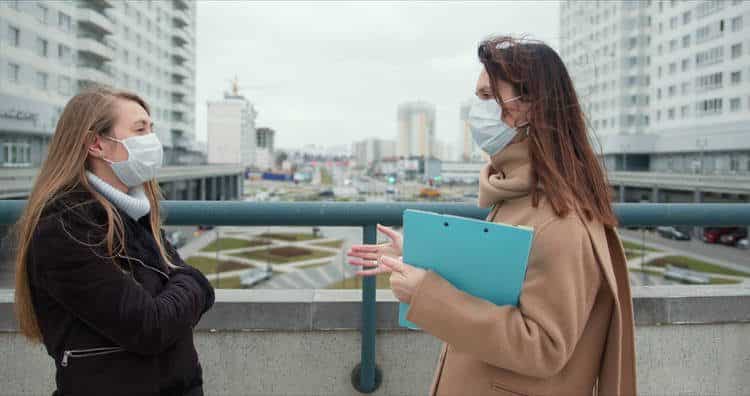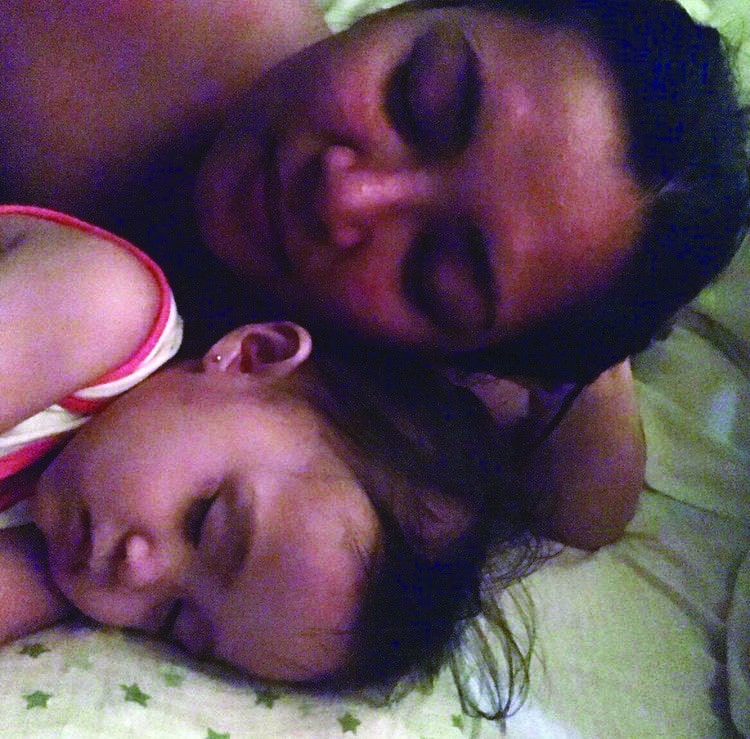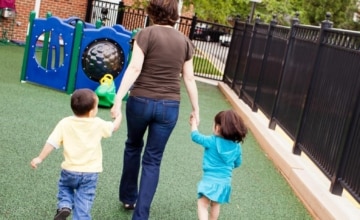Sarah LeMoine, Kristen Greene, Kathleen Mulrooney, and Katrina Macasaet, ZERO TO THREE, Washington, DC

Editor’s Note: The content of this article is adapted from a webinar of the same title, presented on May 20, 2020, which is available for ZERO TO THREE members here.
Professionals who are working to support infants, young children, and families are called upon to build others up, and doing so requires a strong foundation. Yet, in these challenging times of a global pandemic, all are standing on unfamiliar ground. In fact, it feels as if the ground is continually shifting. Social distancing, sheltering at home, and quarantining have dramatically changed personal and professional lives, presenting a whole new set of stressors for everyone and challenges that require new approaches and skill sets. New working environments, new technology platforms, changing or unrealistic expectations from employers or oneself, job losses, children at home…the list goes on and on. The toll this stress can take is real and can take many forms in one’s personal and professional lives. The good news is that there are things that can be done to minimize the impact of stress and promote professional resilience such as self-care, reflective practice, and mindfulness techniques.
How We Are Is as Important as What We Do
The work at ZERO TO THREE is guided by the essential belief that “How we do our work is as important as what we do” (Pawl & St. John, 1998). Along with the platinum rule “do unto others as you would have them do unto others” (Fenichel, 1992, p. 11), these guiding principles are foundational to effectively serving very young children and families. In this article, we explore how these values and beliefs contribute to understanding compassionate care and empathy, and to reducing the professional hazards of burnout, vicarious traumatization, and compassion fatigue. We also explore prevention strategies and other tips for professional resilience.
When Helping Becomes Hazardous
The pandemic has required that professionals across disciplines adapt to changing circumstances and navigate uncharted territory. Rarely have both professionals and families shared the experience of global collective crisis. There is a shared reality of not knowing, of having to suspend certainty, and a need to be willing to “let go!” of things that cannot be controlled.
People who work in the helping professions are at risk for some professional hazards when it comes to well-being. The work is personal and often intense. During times of crisis, many early childhood professionals are classified as “essential workers” who are called upon, and typically accept the challenge, to go above and beyond on behalf of young children and families. The capacity for empathy and compassion can be a double-edged sword in that it allows professionals to truly connect to the families they serve and understand their feelings and perspectives, but can also deplete their own personal reserve and increase the risk for compassion fatigue, secondary or vicarious traumatization, and burnout.
Compassion Fatigue
Many in the helping professions (e.g., early childhood education, home visiting, child welfare, social services, mental health, early intervention, and health care) have caregiving roles at home with their own families, perhaps across generations, while also trying to manage their role in caring for children and families in their professional care who are in extremely challenging circumstances. Being in the role of caregiver for extended periods of time or across different relationships can deplete one’s emotional and physical (and sometimes financial) reserves.
Compassion fatigue refers to the emotional and physical depletion and fatigue that occur when helpers engage in emotional labor and are unable to replenish (Figley, 1995a, 1995b, 2002). This sense of fatigue or exhaustion may overtake a person and cause a decline in their ability to experience joy or to feel and care for others. Signs of compassion fatigue include:
- feeling burdened by others,
- blaming oneself for others’ suffering or for one’s inability to do “more,”
- loss of pleasure,
- difficulty concentrating,
- insomnia,
- physical and mental fatigue, and
- bottling up feelings.
Vicarious Trauma
Vicarious traumatization (Pearlman & Saakvitne, 1995), also referred to as secondary trauma, is the impact of indirect exposure to difficult, disturbing, and/or traumatic images and stories of the suffering of others. Over time, repeated exposure to toxic or traumatic content can have a negative impact on one’s functioning, perspectives, and overall mental health. These effects may include heightened arousal and jitteriness, disturbing dreams, inability to fall or stay asleep, visualizing traumatic scenes in one’s mind, or emotional numbing and withdrawal from others. It is important to recognize individual warning signs and develop coping strategies to mitigate these negative effects.
Red Flags
Some of the warning signs of vicarious trauma that can also lead to burnout include the following:
- physical symptoms: trouble sleeping; feeling fatigued; issues with eating; tension related symptoms such as headaches, stomach issues, back pain, muscle pain, heart palpitations, increased blood pressure
- behavioral symptoms: trouble focusing, irritability, angry outbursts, crying, forgetfulness, numbing, over- or undereating, abusing substances
- emotional/psychological symptoms: feeling excessively worried, angry, sad/depressed, cynical, worthless, helpless or like an imposter; experiencing
When professionals experience traumatic events in their own lives, it is even more challenging to negotiate the trauma of the families they are supporting. A history of trauma and lingering psychic wounds can make one more vulnerable to others’ traumatic events. A child or family’s trauma can become reminders or triggers for the professional’s unresolved issues. At the same time, with awareness and support, past experiences can offer insights and sensitivity from which to evolve and help others to do the same.
Burnout
Burnout refers to feelings of being emotionally exhausted and overextended by the conditions of work. These conditions might include conditions of danger, physically inadequate conditions, intensive work, and long hours. Burnout often includes feelings of diminished personal accomplishment, a sense of lowered competence, and a lack of successful achievement in work with families and colleagues. Both compassion fatigue and vicarious traumatization can contribute to burnout. However, burnout can occur from other factors such as intensity and concentration of workload with little support. With the many pivots professionals have had to make due to Covid-19, such as quarantine, social distancing, and navigating new virtual connections, many early childhood professionals are struggling with this issue.
Mental Health Risks Amid a Pandemic
In addition to the professional hazards discussed, the pandemic itself has contributed to greater mental health problems in the general public as well as in those in helping professions. Anxiety and depression and even posttraumatic stress disorder are on the rise (Centers for Disease Control and Prevention, 2020; Vindegaard & Benros, 2020), as are often symptoms of chronic anger and irritability. Risk for substance abuse, or even suicide, has grown due to an increase in these disorders, experience of abuse or domestic violence, and isolation. Many people are involved in unhealthy choices such as increased alcohol consumption, overeating, and use of other substances. Those with previous substance abuse disorders are at higher risk of relapse. In many cases, complicated bereavement is also a concern for families who have lost a loved one and are unable to follow traditions around grief and loss because of many current restrictions regarding hospital visitation or the ability to gather in larger groups for memorial services.
Being aware of signs of compassion fatigue, vicarious trauma, burnout, or mental health challenges, and acting on these signs to engage in self-care, seek support through reflective supervision, or reach out for professional intervention, can help with early detection and more timely efforts to reduce distress and build resilience.
Building Resilience
Professional resilience speaks to the individual professional’s capacity to thrive even in challenging situations involving high demand. The concept of resilience is embedded in the understanding that everyone is going to experience adversity or challenges to well-being. Even positive learning and growing creates stress. Resilience is the ability to recover from adversity— it helps one get back to or stay with a sense of well-being no matter what happens. It includes adapting to and integrating one’s experiences.
There are many different factors that can impact resiliency. Personal strengths and the number of protective factors in one’s life are key in this regard. Mindfulness and other self-care practices can be helpful in integrating experiences and healthy brain functioning. Strong social connections are important, as is the state of one’s support system.
The environmental factors in communities and in one’s work that impact well-being also impact resilience. If one is constantly having to navigate within a system that is depleting rather than supportive, it’s very difficult to be resilient and feel well. This conundrum, when working in under-resourced and overburdened systems and communities, leads to feeling responsible for the struggles that are outside of one’s control.
Parallel Process
The platinum rule, “Do unto others as you would have them do unto others” (Fenichel, 1992), realizes that helping professionals often do not “do unto themselves” as well as they should. This phrase also emphasizes the benefits of parallel process in interactions with others. The term parallel process describes understanding that what happens in one relationship can impact other relationships and that there can be parallels in emotions, interactions, and dynamics in looking at the nature of these relationships. Feelings and interactions in one relationship influence the feelings and interactions in another, and they can be feelings from past relationships or present ones.

The capacity for empathy and compassion can be a double-edged sword in that it allows professionals to truly connect to the families they serve and understand their feelings and perspectives, but can also deplete their own personal reserve. Photo: fizkes/shutterstock
Parallel process has also been described in terms of picturing the ripple effect. Picture a pebble tossed in a pond and how the impact of the stone on the water causes ripples to flow beyond the source of impact. The one interaction (positive or negative) can have lager impact beyond that single interaction. Awareness of how feelings, behaviors, and interactions in one relationship are being played out in a parallel fashion in another is important in understanding patterns that may need to be addressed and improved. Reflective practice and supervision are important ways of identifying and exploring parallel processes in many relationships in early childhood work.
Protective Factors
Individual protective factors that help one face adversity include the ability to reach out for help/support, work-life fit/ balance, continual learning and growing, setting appropriate boundaries, and recognizing and expressing feelings. Strategies to develop a positive focus include (Best Start Resource Centre, 2012) the following:
- Build positive, supportive relationships—one can tolerate stress better with support and mitigate it more effectively.
- Think positively—focus on what is in your control, look for solutions, and expect positive outcomes.
- Act! Positive action, even small steps, brings progress. Inaction increases stress.
- Focus on strengths—and how to use them in a challenging situation which can also improve overall job satisfaction.
- Joy—consider what brings joy to work and in life, and look for opportunities to increase it.
- Health and well-being. It is important to consider habits outside of work, such as eating, sleeping, social connections, and exercise, and to seek help from professionals when necessary.
- Humor—laughter and fun alleviate stress and can create stronger relationships.
Mindfulness
The mind tends to wander, jumping from topic to topic, craving or wanting, disliking or aversion, judging, dwelling on memories, regretting, worrying, planning, deciding…humans have a hard time simmering down the noise and untangling the knots in their heads. The practice of mindfulness can help.

People who work in the helping professions are at risk for some professional hazards when it comes to well-being. Photo: KeyStock/shutterstock
Mindfulness is an ability to be fully present, taking in what’s going on in a way that is non-judgmental and accepting. It is about being fully aware of one’s emotional experiences in order to put distance between the stressors in one’s life and how one responds to those stressors. It’s centering oneself in the present moment rather than getting swept away by past or future feelings and by that noisy, constant flow of thoughts—often critical or judgmental. It is a kind, curious observing of the mind and also of what is going in in one’s body.
In work with young children, families, and colleagues, one beneficial outcome of practicing mindfulness is an increased capacity to be responsive and reflective rather than reactive in those relationships and interactions. Mindfulness is a practice of intentionally being present and centered in the moment— the greater the regularity of practicing mindfulness, the more significant the results. Mindfulness is an important aspect in the related concepts of well-being, resilience, and trauma-informed care because it is a specific tool that helps to improve emotional regulation and co-regulation, the capacity to reflect on behavior, and the fundamental process of self-awareness.
Self-Care
Self-care promotes personal and professional well-being and is not selfish or indulgent—it is essential to ensure one is physically, emotionally, and mentally capable of being there for young children and their families. Self-compassion is another important component of well-being that is related to self-care and mindfulness. Individuals must recognize when they are judging or being harsh with themselves. When professionals get still and pay attention to their thoughts—and what they are telling themselves—they might start to recognize all the ways they are harsh internally, and the inner critic might become more apparent. This recognition provides an opportunity to stop those messages. Then, they can offer self-kindness instead and also recognize that their feelings of suffering are part of the shared human experience and that they aren’t alone in having a tough time or making mistakes.
There is a difference between self-criticism and self-guidance or even having high expectations. One can have high expectations and still be warm and encouraging rather than self-critical. Some of the research on self-compassion has discovered that self-compassionate people tend to be better able to recognize faults and make corrections and they have less distraction from negative emotions. Self-compassionate people are actually more resilient and effective in their work. Sometimes self-compassion is confused with being selfish but self-compassion truly shifts the focus from self to other—it actually leads to warm connectedness.
Reflective Practice
While definitions of reflective practice vary by discipline, broadly speaking it is the process of reflecting on one’s actions to engage in a process of continuous learning and self-awareness. In a sense, reflective practice is an acknowledgment that there is often no one “right” solution and that in many cases there can be multiple “truths” or possibilities to be explored. An attitude of wondering and inquiry encourages curiosity. Reflective practice encourages professionals to slow down and consider the possible implication of their behaviors, actions, and decisions (during and after their work), in a way that influences their next steps (Heffron & Murch, 2010). Reflective practice provides the opportunity to strengthen both mindfulness and self-compassion and explore parallel process in an atmosphere of growth and support.
Moving Forward
Living and working through a global pandemic have brought unprecedented challenges at home and at work. It is easy to get caught in over-identification, judgement, and isolation. However, there are tools to help tend to the emotional and psychological upheaval brought about by the unsettling changes in the world. Doing so will allow one to choose mindfulness, practice self-compassion, and find connection in the hard work of protecting young children, promoting strong families, and ensuring effective practice.

Responding to our needs supports our well-being. Photo courtesy of Katrina Macasaet
Learn More
Getting Started With Mindfulness: A Toolkit for Early Childhood Organizations View the toolkit here
Relationship for Growth: Cultivating Reflective Practice in Infant, Toddler and Preschool programs L. Gilkerson & R. Shahmoon-Shanok (2000) In J. Osofsky & H. Fitzgerald (Eds.), WAIMH Handbook of Infant Mental Health: Volume 2 Early Intervention, Evaluation and Assessment (pp. 33–79)
Being in Charge: Reflective Leadership in Infant-Family Programs R. Parlakian & N. Seibel (2001) ZERO TO THREE
Calmness Fosters Compassionate Connections: Integrating Mindfulness to Support Diverse Parents, Their Young Children, and The Providers Who Serve Them R. Shahmoon-Shanok & H. Carlton Stevenson (2015) ZERO TO THREE Journal, 35(3), 18–30
Reflective Supervision: Past, Present, and Future L. Eggbeer, T. Mann, & N. L. Seibel. (2007) ZERO TO THREE Journal, 28(2) 5–9.
Author Bios
Sarah LeMoine, MS, is senior director, Professional Development and Workforce Innovations. In this role, she advances ZERO TO THREE’s education strategy and coordinates these efforts with international, national, and state partners. Ms. LeMoine has focused her career on early childhood professional development systems and workforce issues. She has 30 years of extensive experience ranging from direct service work to national-level research and writing, technical assistance and training, policy analysis, and advocacy. Previously, she directed Administration for Children and Family’s Professional Development Workforce Center at ZERO TO THREE, the National Association for the Education of Young Children’s State Workforce Systems Policy, and held leadership and technical assistance positions with the National Child Care Information Center and the Wheelock College Center for Career Development.
Kristen Greene, PhD, is program director, Professional Development and Workforce Innovations. Dr. Greene contributes to the design and development of program content and leads the delivery of professional development offerings focused on the ZERO TO THREE Critical Competencies for Infant-Toddler EducatorsTM. Dr. Greene co-facilitates trainingof- trainer events; designs and delivers presentations at state, regional, and national early childhood conferences and meetings; and facilitates virtual and in-person community of practice trainings. She has a doctorate in early childhood, family and literacy studies and brings a wide range of additional professional experience focused on young children, early childhood education, and early childhood education professional development. These experiences include positions as an early childhood special education teacher, child care center administrator, higher education faculty member, and Early Head Start Infant Toddler training and technical assistance specialist.
Kathleen Mulrooney, MA, LPC, IMH-E® Clinical/Mentor, is program director of Infant and Early Childhood Mental Health (IECMH). In this role she is responsible for curriculum development, delivery, and post-training support around IECMH content and practice Ms. Mulrooney also co-leads ECMH cross organizational efforts, advancing ZERO TO THREE’s IECMH strategic framework. She participated in the Diagnostic Classification Revision Task Force which produced DC:0–5TM: Diagnostic Classification of Mental Health and Developmental Disorders of Infancy and Early Childhood (DC:0–5™) and leads the DC:0–5 training efforts around the world. Ms. Mulrooney works closely with ZERO TO THREE’s Policy Center to advance IECMH practice on local, state, and national levels. She has worked to promote IECMH through her various roles at ZERO TO THREE including work with Military Family Projects, Project LAUNCH, and currently as part of the Professional Development and Workforce Innovations team. Ms. Mulrooney brings extensive experience in promoting reflective practice and reflective supervision in a variety of settings and systems. Likewise, she has worked to promote trauma-informed practice and has been involved in disaster response supports nationally. She has published numerous articles and chapters on topics related to IECMH.
Katrina Macasaet, MA, is content specialist, Professional Development and Workforce Innovations. Ms. Macasaet leads the design and delivery of presentations at state, regional, and national early childhood conferences and meetings. In addition, she contributes to the development of researchbased and evidence-informed infant–toddler competencies, professional learning options, and other department content. Ms. Macasaet joined ZERO TO THREE in January 2017 after working as an instructional coach for the Orange County Department of Education and as a child development instructor for Saddleback College. She has an undergraduate degree in early childhood education and a master’s degree in human development.
Suggested Citation
LeMoine, S., Greene, K., Mulrooney, K., & Macasaet, K. (2020). You matter: Professional resilience during collective crisis. ZERO TO THREE Journal, 41(1), 53–58.
References
Best Start Resource Centre. (2012). When compassion hurts: Burnout, vicarious trauma and secondary trauma in prenatal and early childhood service providers.
Centers for Disease Control and Prevention. (2020, July 1). Coping with stress. Access here
Fenichel, E. (1992). Learning through supervision and mentorship to support the development of infants, toddlers and their families: A source book. ZERO TO THREE.
Figley, C.R. (1995a). Compassion fatigue. Routledge.
Figley, C.R. (Ed.). (1995b). Compassion fatigue: Coping with secondary traumatic stress disorder in those who treat the traumatized. Brunner/Mazel.
Figley, C.R. (2002). Treating compassion fatigue. Routledge.
Heffron, M. C., & Murch, T. (2010) The reflective supervisor as team leader and group supervisor. ZERO TO THREE, 31(2), 51–58.
Pawl, J., & St. John, M. (1998). How you are is as important as what you do…in making a positive difference for infants, toddlers, and their families. ZERO TO THREE.
Pearlman, L. A., & Saakvitne, K. W. (1995). Trauma and the therapist: Countertransference and vicarious traumatization in psychotherapy with incest survivors. W. W. Norton
Vindegaard, N., & Benros, M. E. (2020). COVID-19 pandemic and mental health consequences: Systematic review of the current evidence. Brain, Behavior, and Immunity, S0889-1591(20)30954-5. Advance online publication. https://doi.org/10.1016/j.bbi.2020.05.048



